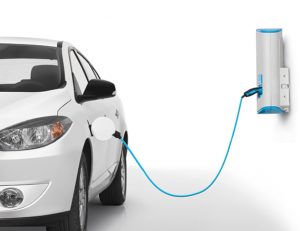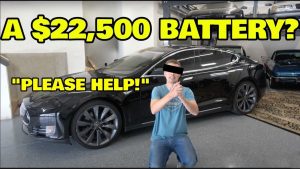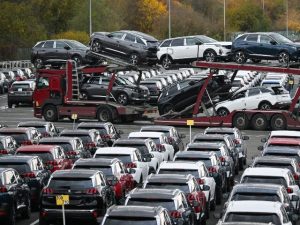Like a fart that can’t be held in anymore, the truth about battery-powered devices (EVs) is finally being emitted. One of these truths – styled a “hurdle for EV adoption” – is the plummeting resale value of these devices.
How about more than 30 percent in just one year? That’s about five times as much loss in over 12 months as you’d typically lose (about 10 percent) if you bought a vehicle rather than a device. It’s a loss that actually fast – as opposed to how long it takes to charge a device.
This latter accounts, in part, for the plummeting value of devices vs. vehicles. The word has gotten out about the time-cost of devices, including the truth about the lie that you don’t have to wait for the device to charge when you plug it in at home. Of course you do. EV apologists pretend it’s not waiting because you’re waiting at home – or because you’re sleeping while the device is charging. But there’s no getting around the waiting – which will become clear if you need to use the car before it’s done charging.
But the real killer is that devices are dependent upon batteries that inevitably lose their capacity to retain a charge – at which point the device’s value plummets because it doesn’t work anymore and the cost to make it work again (i.e., a new battery) is too high relative to the value of the device itself.
It’s easy to understand how this works.
Everyone who owns a phone or even a laptop already knows how it works. After a few years, the device stops working – unless you keep it plugged in (which means you’re stuck wherever you’re plugged in) because the device’s battery has gotten old and won’t hold charge anymore. By the time this happens, the device itself is already an old device. Electronic devices age much faster than mechanical things, which also don’t need to be the latest things and routinely work for decades and so continue to have value and hold their value for decades.
Most people want to have the latest device – or at least, not an old one that’s lacking all the latest features or that won’t work with the latest updates. So when their old device won’t hold a charge anymore and they find out that it will cost them 50 percent of the rapidly plummeting remaining value of their device to get a new battery for their old device, what do most people do?
They throw the old device away.
That is easy enough to do – financially – with a small battery powered device such as a phone or even a laptop because the cost of a new device isn’t prohibitive.
But it is effectively impossible – financially – for most people who own a large and very expensive device such as an electric vehicle to replace the thing’s battery because most people haven’t got the $15,000-plus it costs to buy a new battery, which they can’t (realistically, most of them) pay for in cash and can’t (also realistically) finance because they’d be putting that $15k on a credit card, at probably double-digit interest, compounded monthly.
So they walk away from the device, which they probably leased (most devices are leased rather than bought because of the high cost of a new device) and leave the dealer that leased it holding the bag. Now the dealer has to eat the cost of the loss, which he can’t recover because most people don’t want a used device, even if it has a new battery. Because it’s still an old device and it will inevitably need a new battery and when it does, by that time, it will be an even older device and probably have lost 70 percent of its original value.
These losses have consequences – including for the cost of leasing a new device, which has become high in proportion to the plummeting residual value of the device by the end of the lease term. It is the projected residual value – i.e., the remaining value of the vehicle after “x” number of years – that is the primary factor affecting how much a lease costs. A device that loses 30-plus percent of its value-when-new after as little as one year is going to cost a commensurately higher amount each month to lease than it would cost to make monthly payments on a vehicle that only loses about 10 percent of its value each year. It will also still be worth something by the time you eventually pay it off – in the event you decided to buy.
“Tumbling resale values aggravate buyers’ worries that an EV isn’t worth the price or the potential headaches, says USA Today. “They already worry about EVs’ high prices, charging, lack of choice, and driving range. Now, they fear when it comes time to sell the vehicle, they’re not going to get much back.”
It’s not a “fear.” It’s a fact.
A related fact is that vertical depreciation negates the device’s supposed “savings” in not having to spend money on gas – and oil/filter changes.
Not surprisingly, people are eschewing devices in favor of vehicles. This is reflected in double-digit declines in the number of devices being bought (and leased). Which has triggered a walking back of the “commitments” made by a number of vehicle manufacturers to make more devices because they’re beginning to realize they can’t force people to buy these devices.
Which brings up an alarming possibility that is likely to become a certainty after the pending selection, if the Orange Man isn’t selected. And perhaps even if he is.
It is that the automakers will demand that EVs be forced on people – not just forced onto the “market” – by forcing vehicles that aren’t devices off the road (and not just out of the showroom). There are a number of ways this could be done, including a massive “carbon tax” on vehicles that aren’t devices – or on the fuel that vehicles need. That is just a matter of the how.
The why is self-evident.
Having poltroonishly (and short-term greedily) bought into the pushing by the government of devices into production for a “market” that doesn’t want these devices, the manufacturers – the car companies – are now hemorrhaging billions on devices and that bleeding has got to be staunched somehow.
The most obvious way to staunch it is to leave people no alternative to the devices they’re pushing.
Bet your bippie it’s coming.
. . .
If you like what you’ve found here please consider supporting EPautos.
We depend on you to keep the wheels turning!
Our donate button is here.
If you prefer not to use PayPal, our mailing address is:
EPautos
721 Hummingbird Lane SE
Copper Hill, VA 24079
PS: Get an EPautos magnet or sticker or coaster in return for a $20 or more one-time donation or a $10 or more monthly recurring donation. (Please be sure to tell us you want a magnet or sticker or coaster – and also, provide an address, so we know where to mail the thing!)
If you like items like the Baaaaaa! baseball cap pictured below, you can find that and more at the EPautos store!













Before they ban all the ice cars…….
In 2025 you will be able to import a series one 1999 Lotus Elise Sport 160….it weighs about 1500 lb, a nice light sports car…..
One of the best driver’s cars ever built….there are very few available…only 300 and something were made…. so their prices will rise….
https://www.youtube.com/watch?v=DnB6kqGZmqE
39 pages of used Teslas at one cars for sale website. Lots of websites have used EVs for sale.
More than likely it is more than 700 used Teslas, 25,000 to 32,000 USD, 2021 and 2022 Teslas.
Some 2023 Teslas are 40,000 used.
In a few years, you’ll be forking over 15,000 dollars for a new battery.
EV’s are being dumped onto the used market hoping to catch buyers, me thinks.
Probably all from the Hertz rental inventory, gotta get rid of the EVs somehow.
I traded my old cellphone for a new one and received an 800 dollar credit on the purchase of a new and better cellphone. The sum of its parts are worth more than the whole.
Can’t sell something that is not in demand, a saturated market, very little demand is what happens.
Buy two good used ICE vehicles and forget about an electric car.
Traveled from Minneapolis to Chicago 52 years ago on Milwaukee Road passenger train. The passenger cars were comfortable and had well-crafted interiors.
Avoid Akron in Ohio.
[…] Guest Post by Eric Peters […]
The most obvious way to staunch it is to leave people no alternative to the devices they’re pushing.
And not only for cars, it would seem. Case in point – European truck maker Scania (a subsidiary of Volkswagen, and historically based in Sweden) have gone all-in on battery-powered trucks, but in the first quarter of this year they only managed to sell 47 of them (as opposed to 26,000+ diesel ones)! So what is their reaction to the poor sales of their battery trucks? They’re demanding new legislation.
Here’s a (Google translate) excerpt of the (originally Swedish) article (emphases are mine):
“Now [Scania] goes to [Swedish state broadcaster] SVT and complains about a lack of sales. In the first quarter, only 47 electric trucks were delivered, down 36%, and giant factories are idle. Now Scania is demanding new legislation to speed up sales.
– We have invested so much in this transformation, so without the right political decisions, we have an entire industry in Europe that has an uncertain future, says Jennie Cato, head of public affairs, to SVT.
Among other things, Scania has built a large factory for battery assembly in Södertälje, which is hardly used. According to the PR manager, two of the problems are that the charging infrastructure is too poor and the trucks are too expensive.
– What is needed is a lot of legislation linked around the ecosystem so that we can put these trucks on the road in Europe.
Scumbags! All of them!
We tried to tell them but they got out the kneepads in front of the government. Look at what you get.
VW of all people should have figured out by now that throwing yourself at the mercy of the court is a losing game
Yep, “the tinfoil hats of the far right”. Only a “nut job” would be opposed to being herded into a fifteen-minute city.
https://newrepublic.com/article/181593/strange-villainization-walkable-city-15-minute-moreno-book
They are right…these 15 min city/prisons look great…..
This video shows how great they are….why would the slaves complain?….
https://www.youtube.com/watch?v=vWkepoLUZfs
Ah, yes. Bike paths – the leftist’s answer to everything. Too many cars? Bike paths. Urban congestion? Bike paths. Long commutes? Bike paths. Homeless pooping on the sidewalks? Bike paths. Drugged out, mentally deranged lunatics stabbing passersby? Bike paths!
[Most people want to have the latest device – or at least, not an old one that’s lacking all the latest features or that won’t work with the latest updates.]- Eric
You are sooooo right!
Not only that,,, those same A-holes almost demand you have one too. At the hospital undergoing a heart procedure the lazy A-holes would not tell my wife how things were going or when it was done. Why? Because they would have to walk 50 feet! OMG! They wanted to call her on her cell. If you seen the land whales that now occupy hospitals one wonders how anything gets done. Even filling out the never ending STUPID!!!! questions like – Are you pregnant?,,, Have you coughed lately? (covid) ,,, Have you been out of the country within the last 6 months,,, while they allow millions into the nation without any vetting paid for by DS taxpayers. It’s a comical act. Pure unadulterated nonsense. Add to that they now have Mr. Digital,,, an extra large useless device about 9″ x 11” x 2in. They use this junk to check in to the emergency rooms as well. I watched a lady who could barely stand trying to use it. Things have passed hyper stupid and are now gravitating toward ridiculous. The ‘doctors’ ? They;re running around looking cool playing the mating game. Looking at their choices I couldn’t imagine why? I never spoke to one doctor. The persons now doing the actual work are xxxRNs with a bunch of letters in front of RN. Yes we are now cheapening our medical system so corporate can hand out more bonuses.
If these digital/electric vehicles are any where as useless as the rest of our digital junk then mankind is in serious trouble. IMO stay clear of the medical system if you possibly can.
The fact that the vast majority of nurses in this country are at a minimum overweight with a large fraction being obese tells you –everything– you need to know about “healthcare” in the US. It is fake & gay, just like everything else. Your food is poison and the pharma and medical industry are in cahoots with big AG to keep you sick. Everyone profits!
https://revolver.news/2024/05/watch-coca-cola-insider-spills-disturbing-secrets-surrounding-rigged-scheme-with-big-pharma/
The “transition in digress” loading the donut cabinet at the store really needed a shave.
Thats entertainment
Uh, oh, more concerns.
https://www.thestreet.com/electric-vehicles/new-study-suggests-evs-are-supercharging-an-impending-environmental-crisis
Dealers & their sales weasels are on the front line of what consumers want / don’t want / what they’ll pay / and what they’ll pay.
EVs are such an albatross, that any dealer with a shred of sense would simply refuse to buy ’em from the OEMs.
Dealers & their sales weasels are on the front line of what consumers want / don’t want / what they’ll pay / and *how* they’ll pay.
You’d think so.
But the OEMs will tell them they have to accept shipment of a certain number of EVs, or else they won’t send them any of the more desirable cars like Corvettes, Mustangs, F-150s, etc.
The dealerships are caught between a rock and a hard place. So, they would almost rather handle used cars. More profit, less hassle.
For most people, cars are a commodity item. Crossover SUVs are so unremarkable it’s nearly impossible to tell the difference between makes and models. Much like Android phones, whatever motivation you have to buy a car is pretty much whomever happens to have the best deal at the time. Sure, there are plenty of people who want interesting cars (even then opting for the “whatever everyone else is driving” Taco or F150 or BMW 3), but the masses are happy with their Hyundai RAV4 Turbo Premium Latitude Edition. There’s so little difference it’s like buying roof shingles or a television.
Random thought: Why hasn’t a manufacturer teamed up with Starbucks for the Grande Caramel Cinnamon Dolce Latte Frappuccino® SUV? Includes Grande cup holders and spill resistant fabric seats in green, white and black branding. The satnav could even have a Starbucks button to route you to the nearest drive-thru…
The engine? Well, that’s so indestructible now that one doesn’t really need to think about it. Just change the oil and don’t poke holes in the radiator and it will last for a quarter million miles. Drivers become disconnected from the vehicle, they’re not emotionally invested in it, it’s just to get you where you need to go. About as much fun as flying in an “AirBUS” instead of a Lockheed TriStar.
And when it does let you down, it’s devastating. You don’t expect cars to quit suddenly. They used to fail all the time, it kept you on your toes. Now, maintenance is a nuisance to be farmed out (except that inflation is killing that idea). Less of it the better. The promise of an electric device is that it will be as reliable as your refrigerator (well, the old GE Monitor-Top refrigerator maybe…) never needing anything but a charge and never having anything to do but drive it. Of course the charging problem is the non-starter for most of us, but ignored are the 15K lifespan of tires, the coolant system leaks and of course the battery getting tired. For sure 250K isn’t gonna be the norm, and it isn’t just early adopter problems.
Forcing EVs will result in too much political blowback.
Cost of living is already much higher and here to stay.
To afford an EV, financing will be required. What happens to those who can’t get financed?
There are a lot of those people.
Subsidies I guess. Where does that money come from? It’s like constant student load forgiveness.
Or you can lease to avoid the future maint cost. Then there will be a pile of used EVs no one wants, driving down the price of new. Manufacturers will never make $ on them. More subsidies.
Debt service is already going to be $1 trillion.
Print the money. Which will make the situation worse.
A day of reconning will get here eventually. Something has to give.
“What happens to those who can’t get financed?
There are a lot of those.”
Electric scooters
‘devices are dependent upon batteries that inevitably lose their capacity to retain a charge’ — eric
Although the 12-volt lead-acid batteries used in ICE vehicles are not identical to the gigantic lithium-ion batteries used in EeeVees — they are more like first cousins chemically — plenty of us have plenty of bad experience with them.
Cheap-ass batteries that I buy at AutoZone barely last 2-3 years, and sometimes only one year. It gets tiresome. Why would I ‘invest’ in a thousand-pound behemoth Li-on battery which is subject to the same long-term degradation and random catastrophic faults?
Battery technology fundamentally sucks. Think how many times in your life discharged and faulted batteries have caused you inconvenience. To me, batteries exist on the darker side of life, along with bedbugs, STDs and the Bidens.
If elected to Clowngress, I will introduce a bill making conspiracy to pimp EeeVees a federal felony, punishable by public electrocution at the nearest charging station. Bzzzztttt!!!!
FWIW, Google did a software update to their Chromebooks called adaptive charging. It basically charges the battery to 80%, and then takes its sweet time going the rest of the way to 100%. Since I got the adaptive charging update, my Chromebook’s Li-Ion battery hasn’t lost any of its “health”; it still has 99.02% of its charging capacity since I got the update. A similar software update could be issued for EVs, so as to make the batteries last much longer. Indeed, if the powers that (shouldn’t) be want to “spur” widespread EV adoption, they’ll have to do something about battery life.
They will have to do something about charging performance as well, since charging is ludicrously slow today. Your “adaptive charging” idea would make matters even worse in that regard, and so would be a step in the wrong direction. The best option would probably be for auto manufacturers to abandon EVs altogether, and only reintroduce them once technology that makes them competitive with ICE-powered cars is available (if that ever happens).
I agree, EVs would be best abandoned, but carmakers aren’t being given that choice; if they were, they’d opt out tomorrow. My only point was that lengthening battery life could be solved, as it’s one problem EVs have.
“They” need to admit batteries cannot scale up to gasoline.
Electric cars are like “gender confusion” this way.
Eric,
I think that there will be some pushback on this. Why? Because the vast majority of people NEED their cars! Most of us live in areas that don’t have good public transit; we couldn’t ditch our cars if we wanted to. Furthermore, even if they wanted to, most people cannot afford to move to the city, as housing inflation has hit the cities too. Even if they could get enough for their suburban residence to make the move feasible, they’re not going to do it; they have a 3% mortgage, and they have no desire to trade that in for a 7% mortgage. It’s the latter factor that’s one reason why people aren’t buying houses; they don’t want to surrender a good, low mortgage rate for a higher one. Even though 7% is a historically good rate (e.g. my parents had a 7% mortgage on our house), it’s high for these days and times.
I know that the powers that (shouldn’t) be want us out of our cars. They’re going to have to back off and slow their roll, lest they wake up the majority of people and incite massive pushback. As I said, the vast majority of people cannot live without their cars. Our whole society is built around the car, and that won’t change any time soon. TPTB are going to have to hold off long enough for EVs to be better than they are now, so people can be “nudged” into them.
Thing is, everyone needs cars. Last week I was flying out of DEN. In years past when I lived across the street from KASE I could walk to the airport. If I lived in downtown Aspen I could take one of the frequent buses that ran down valley, almost all of them stopped at the airport. But now that I’m out in the sticks, well, I have to drive somewhere, and given the outlandish parking and connector flight prices at most feeder airports, it’s far cheaper to drive and takes about the same amount of time when you factor in layovers and such.
But while I was sitting in a traffic jam on Peña Blvd, I noticed the light rail line that runs parallel to the highway. I noticed that it was empty. As in, no trains were running the whole 20 minutes or so it took me to get to the airport. They claim to run every 15 minutes, so maybe they had a problem? But even still, to take all the traffic off the highway they’d need to run trains every 5 minutes or more, back to back. No way they could keep up that pace without staffing way up, increased track and vehicle maintenance. Very quickly they’d be charging much more than you driving yourself just due to all the union labor required. Oh, just add more cars, right? Except that it’s LIGHT rail, so physics becomes an issue. Traction motors can only pull so much weight before they melt.
From where I live, Corona, CA 92882, at the eastern end of Santa Ana Canyon, it is simply NOT POSSIBLE to use Metrolink, the local light rail system, to travel to *any* of the three major airports in SoCal, namely ONT, SNA, or LAX.
The train don’t run from here to there, *AT* *ALL*. Never did. Likely never will.
Here’s a good tune:
https://www.youtube.com/watch?v=rBryup1Dbt4
Supply your own appropriate lyrics.
Back in the Old Days, the Lemon Capital of the World, a town of at most 30,000, was a stop on the AT&SF. The train depot still stands, but has long since been converted to other use. Amtrak doesn’t stop in this town, now a city of 170,000 or so. To board Amtrak, you must take Metrolink to either Riverside or Fullerton.
Riverside, a city of 320,000 and the county seat of a county of 2.47 million people, has no Amtrak station, only a platform from which to board the train. the closest Amtrak station is in San Bernardino
https://en.wikipedia.org/wiki/San_Bernardino_Santa_Fe_Depot
Passenger rail was never very profitable. The real money was made on the mail car. Once airmail and trucks led to the centralized and mechanized sorting facility there wasn’t any reason for the mail car and so the railroads dumped it off on the government who thought they needed it, ostensibly for moving troops around.
Same thing with streetcars, AKA light rail. No one wants to stand around on a platform for 20 minutes waiting for a train when there’s other options available. Even if that alternative costs more, it saves time and increases efficiency at the expense of taking up more space.
> moving troops around.
My Dad, who was USAAF in WWII, spent some time on troop trains, swore he would never take the train in civilian life. When the family traveled it was either by automobile or airline.
RK,
Railroads ran train service because they were REQUIRED to do so; that’s it! The gov’t has been involved with railroads from the beginning though; if not for the massive land grants they got, railroads couldn’t have grown like they did in the Nineteenth Century. Well, if one gets their largesse from gov’t, one can be ordered to do things by gov’t too; since the railroads were largely created by gov’t intervention, the gov’t had the leverage to tell them what to do. The proof in the pudding is that, as soon as they were allowed to drop passenger service, railroads did so virtually overnight, thus bringing us Amtrak.
> massive land grants [of land which properly belonged to the Native Americans] to a favored few
https://en.wikipedia.org/wiki/Big_Four_(Central_Pacific_Railroad)
>couldn’t have grown
Except that, at the time, the alternative was animal powered carts and wagons on dirt trails, so initially the Iron Horse did make economic sense, AFAIK. A few insiders got filthy rich, but the public did get a better means of transportation, for both passengers and freight, than had previously existed.
>Ambrose Bierce lampooned the “Big Four” in his work “Black Beetles in Amber”, a collection of satirical verses attacking various prominent Californians. In “The Birth of the Rail”, “road agents” (bandits) Happy Hunty (Huntington), Cowboy Charley (Crocker), and Leland The Kid (Stanford), joined by minor devil Sootymug (Hopkins), give up robbing stage coaches for the much greater loot of railroad operation.
There was an alternative that the railroads supplanted: canals. Yes, at the time, railroads were the best transportation mode available, so they would’ve grown. However, the gov’t land grants gave them help.
My point was that, since gov’t had intervened on behalf of the railroads; since the railroad and gov’t were in bed with one another; then the gov’t could lean on the railroads and force them to carry passengers even though they lost money doing it. As the Fella once said, if you sleep with dogs, you’ll awake with fleas.
> canals
Also navigable rivers, e.g. Mississippi.
I take your point, which is certainly valid in principle. He who pays piper, calls tune.
>gov’t could lean on the railroads
Yes, could. But did the U.S. gov’t actually do this? By all means, please share that data, if you have it.
The Wikipedia article on James j. Hill
https://en.wikipedia.org/wiki/James_J._Hill
notes that, even though:
>The Great Northern was the first transcontinental built without public money and just a few land grants
Hill was concerned about the possibility of government meddling in railroad tariffs for freight as well as passengers, and took steps to head it off.
Evidently, the interstate commerce clause gives the FedGov all the excuse it needs, regardless of any sweetheart deals with railroads or any other industrial companies (e.g. Tesla).
Jim Hill rode the rails to make sure the trains were on schedule.
“You can throw a rock anywhere in North Dakota and hit a Republican.” – James J. Hill
Jim Hill didn’t like Republicans. Throwing rocks at them had to be sporty for Jim.
The Q, the Chicago, Burlington and Quincy took control of operations, becoming the Burlington Northern then later on the BNSF.
Some Great Northern employees were not happy that the Burlington Quincy became part of the Great Northern.
It got their goat.
My dad worked on the GN for many years and retired after working 35 years.
With the exception of Union Station and 38th/Blake the density near the stations is pitiful so you’d probably need to drive and park at a park and ride anyway, where your car is all but guaranteed to get either a window busted out or your cats stolen.
I took the light rail from the station near Arapahoe to downtown once just to check it out and get some dinner on the 16th street mall. I was the only one on the train going into downtown but coming back must have been the end of rush hour or something because it was standing room only. Oh the humans! And the “international” smells after a long day slaving away at the keyboard.
Regardless how people are pushed to buy EVs, they can’t be forced to buy something with money they don’t have. We are on the cusp of a monetary disaster. So what does FedGov do? Make everything cost more, while doing nothing to increase your income. Where do EVs fit in that picture?
Manufacturers lose $100,000 on every EV they sell…..
They kept the real cost of these abortions hidden….
Eventually….soon….after ice cars are banned….the price of these abortions will have to rise to cover the real costs and give a profit to the manufacturers…..the $50,00 EV will cost maybe $170,000
$170,000 for a vehicle that is very unreliable….add tens of thousands of $$$ more for maintenance……that is very inconvenient, horrible, lifeless to drive… and rats you out to the slave owners…..nobody will buy this crap …..
The perfect trap….price 98% of the slaves out of the car market…..ban cheap, reliable ice cars……they will walk around their 15 min city/prison……
The slave owners will still drive Ferrari’s and Porsche’s…..
Anon1,
I can’t see that happening. American society is structured such that people NEED their cars! Most of us don’t live near a “15 minute city”, nor can our present town easily be changed into one. Most of us don’t live in an area that has viable transit options; most of us don’t have a good selection of buses or trains available, nor do they go where we need to go. Most people don’t want to move to the city, either. Even if they wanted to, they can’t afford to do so, as housing in the city is more expensive. Then, there’s the matter of higher interest rates. Most “homeowners” have a 3% or 4% mortgage, and they don’t want to sell their house to buy another one with a 7% mortgage. This is one factor cooling off the housing market, as people don’t want to lose their low rate mortgages; they’re staying put as a result.
If TPTB try too hard to get us out of our cars, there will be pushback. Most people cannot live without their cars. America is built around the car, and that won’t change any time soon. People need to get to work, run errands, and so on. They cannot do so without their cars. To threaten someone’s car is to threaten someone’s life. That will back most people into a corner, and you know what happens when you back someone into a corner…
The automobile is not and has never been the enemy…
The automobile has been the most liberating of populations of any device invented by mankind as it allows the driver to go anywhere he wants at any time. If this is not freedom, I don’t know what is.
The automobile allows one to live wherever one wants without limitations. It’s called FREEDOM.
The “war on the automobile” is being waged by those who HATE the concept of free persons having mobility and the ability to travel wherever and whenever they want.
“Livable and 15-minute cities” is laughable, especially here in the USA.
There are those who HATE both “urban sprawl”, suburban and rural living and would force people to live in cities…not being given a choice.
“Livable and 15-minute cities” means people living like sardines in soviet-style apartments is just something that any normal, decent people would be loathe to accept.
The oft-repeated lie that GM bought mass-transit systems to force people to purchase automobiles is laughable.
People don’t want to ride stinky miserable mass-transit systems on someone else’s time schedule but prefer to use their own vehicles. Once again, despite many intellectuals’ disdain, it’s called FREEDOM.
The USA is not Europe.
I among most others relish the freedom that the automobile gives to humanity.
The inheritance tax is largely responsible for urban sprawl. Why? Because many of today’s suburbs and housing developments were once farms. As cities grew and people moved to the suburbs, the farmland’s value increased. When Papa Farmer died, the kids had to sell the farm to cover the death taxes, because farming is an asset rich and cash poor operation. Much of the revenue that comes in has to go for new seed, new equipment, parts, and so on. Because of that, there isn’t enough cash on hand when the parents die, so the kids sell to developers. Eliminate the death tax, and much of urban sprawl will come to a stop.
The satanic slave owners are taking away the slave’s most loved thing…their cars…..they love inflicting pain….
No. They NEED to inflict pain to sustain. This is inhuman and programming machines to protect itself right now.
The slave owners are using the excuse that the slaves are an invasive species, destroying the planet…they are trying to cull the herd….
They are herding them into 15 min city/prisons so they can deal with them, monitor and control them….
Rural living will be banned…..no more traveling, commuting….
More compliant, less dangerous, replacement slaves are being brought in…..
The most hated slaves are the white ones….a huge target….
Three thoughts, in no particular order:
-Having a device means ALWAYS having a payment. With devices, gone are the days of paying off your vehicle in 3-5 years and keeping it for another 3-5, or even 10 years. Because unlike a 3-5 year old vehicle that today has plenty of life left in it, a 3-5 year old device doesn’t—not only because the battery has lost significant capacity, particularly if you fast charged it a lot, but also because the software and hardware are less current and thus less able to handle the latest updates. So your device performs poorly not only because its battery is losing capacity, but also because the software updates exceed the device’s memory capacity, plus after a certain point, the manufacturer may no longer support the device. So you’re looking at a new one in 3-5 years, which is how long devices last. That means you’ll either need to buy a new one, or more appropriately, lease a new one.
-Buying a device can be like having a mortgage with a huge balloon payment at the end, which, in this case, is replacing the battery. At least you own your house free and clear, and likely that house has increased in value. But even if you go ahead and replace the battery, you’re stuck with a device with older electronics and software—which again, the manufacturer may not support. And has anyone done the math to compare the cost of gas, oil changes, coolant and transmission fluid changes, etc. over time vs. the cost of battery replacement?
-Devices are actually WORSE than vehicles from an environmental standpoint. Because, once again, they have to be replaced sooner than vehicles. After all, we’ll never solve environmental problems by buying stuff, because buying stuff is a big reason why we have these problems. And with e-waste being a major contributor to climate change and overall pollution, expect this problem to worsen on a colossal level.
Sooooooo…If you want to save money and save the planet, devices aren’t the answer. Trouble is, I know that, and you know that, but they don’t know that…or maybe they do and don’t care. Because they’re not trying to control the climate—they’re trying to control YOU.
Bryce
This entire GW thing is simply another fraudulent scam. The covid was a scam. The clot shot a killer scam. Food processing plants burning down…. yep another scam. CO2 & Nox another scam to seize property. A trillion printed bux every 90 days,,, another scam to break you via worthless money. The Nuclear war scam to scare the shit out of you like they tried with the fake covid, now with the fake bird flu. What? Think they would release a bug that they could catch as well. Notice the bird flu came out right as the covid scam is fading. Neither having been isolated. They’re using the same PCR tool they used for covid, aids etc.
The cases,,,, the cases!
Exactly…which is why I don’t buy it—because nobody is doing anything that makes sense and works, and TPTB aren’t practicing what they preach.
I consider myself to be an old school conservationist—I’m against pollution and waste. And EVs pollute and waste, contrary to all the hype.
That piece makes me wonder if Big Pharma was also demanding that the Biden Thing try to force Americans to take their mRNA COVID “vaccines” via mandates. After all, they, along with their puppets in establishment media and the government, ruthlessly smeared alternatives to the “vaccines” such as natural immunity & Vitamin D, and even smeared that inexpensive drug Ivermectin as HORSE DEWORMER despite it having once won a Nobel prize in medicine and the WHO once deeming it an essential medicine.
That, and downplaying the role of obesity. You can’t go to the gym and the 5K at the park is cancelled, but go ahead and sit on the couch and cram Gopher Cakes in your face!
Cash For Clunkers 2.0, any non-device eligible for $10k.
Why drive a hybrid when you can cruise to work at Luicrous Speed?
Enough of the public still believe.
The dealers have no one but themselves to blame for this situation. I know too many EV owners and wannabe owners who believe that they will be able to slide into a new battery and get 10-15 years of usable life out of the vehicle by gaming the warranty at the manufacturers expense.
Someone is getting into their heads who speaks with a voice of authority.
“ I know too many EV owners and wannabe owners who believe that they will be able to slide into a new battery and get 10-15 years of usable life out of the vehicle…”
Trouble is, can you slide in new software to update your device, or is your device “no longer supported?”
Roscoe: “Why drive a hybrid when you can cruise to work at Luicrous Speed?”
So what happens when you hit a pothole on our increasing deteriorated streets in your 3 ton EV at ludicrous speed? I’m guessing that is when the fun starts.
Sidewall blowout. Very common, personal experience. Not very fun at midnight driving through one of our shithole “diverse” cities in this dying sewer nation. In this case, Denver, waiting for a flatbed because EVs can’t use donut spares due to weight so you are stuck.
Trapped at a seedy gas station while ‘diversity’ was doing burnouts around the gas pumps and buffalo ass bantu girls were twerking in the parking lot. Looks just like the America I remember growing up in… 🙄